
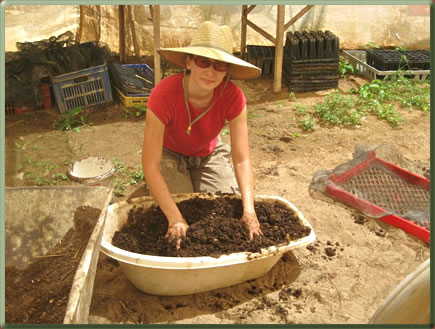
By Brian Bender
author of Farming Around the Country: An Organic Odyssey
I heard about WWOOF (World Wide Opportunities on Organic Farms) halfway through my second year as a high school science teacher. Faced with a classroom full of rowdy ill-mannered teenagers, I thought a farm-themed adventure sounded like a slice of heaven … plants and animals with simple needs … no school bells …. organic food … and 25-hour work weeks.
By the end of the school year, I’d mapped out a 12-month trip, working on 12 separate farms, ranging from Maine to Florida on the U.S. east coast and up the Pacific Coast. The journey opened a whole new world for me – one filled with chickens, cows, goats, apple orchards, blueberry fields, solar showers, compost toilets, stunning scenery and one-of-a-kind people.
My scenery and environment changed drastically from month to month – from an Icelandic sheep farm on the rocky slopes of central Maine, to a lush avocado forest east of the Florida Everglades, to a goat farm in California’s snow-capped Sierra Nevada Mountains. In between the more dramatic landscapes, I worked on farms nestled in rolling hills and ones that felt like islands carved out of the forest.
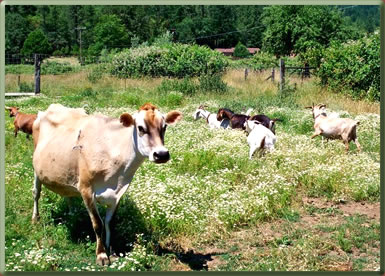
Grass-fed cows and goats thrive at an organic farm in Rogue River, Oregon. Teri White
As for the people I met along the way, my experiences were mixed. I stayed with two separate hosts that sustained themselves on liquor and wine and were perhaps the grumpiest people I’d ever met. I stayed with hosts who were pre-occupied with turning a profit from their farm operation. But overwhelmingly, I stayed with hosts that exemplified the kindest and hardest working people I’d ever met.
Food was the main theme of my year as a WWOOFer. I sampled diets ranging from raw veganism to ones inspired by traditional food preparations … heavy in fermented foods, raw dairy, pastured animal products, and edibles gathered from the wild such as stinging nettles and morels. Regardless of where I found myself, my diet always consisted of incredibly fresh eggs, vegetables, fruits, or raw milk. The source of my food was never more than a stone’s throw away from the kitchen table.
For the first time in my life, I knew where my food was coming from. I knew it was clean food, intended for feeding small communities. This knowledge filled me with a great sense of satisfaction, knowing that I was supporting something of real value.
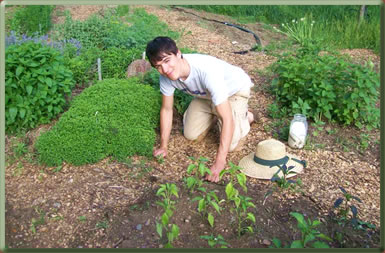
Weeding in the Green Mountains of Vermont. Brian Bender
Join WWOOF-USA® and get the U.S. Member Directory
This is not paid work on farms: it is an exchange of education and culture with food and accommodation thrown in. The WWOOF-USA® Host Farm Directory lists more than 1,300 organic farms and gardens across the country. Each Host Farm Profile contains information about the location, general responsibilities, and lifestyle of the host. Any farm, community, or garden project in the US that is willing to host and accommodate volunteers can participate in the program, open to anyone 18 years or older, regardless of experience.
WWOOF farms offer a variety of educational opportunities, including growing vegetables, keeping bees, building straw bale houses, working with animals, making wine, and much more. With farms in all 50 states, the US Virgin Islands and Puerto Rico, there is something and somewhere for everyone. Become a member.
![]()
First, decide where you want to go. WWOOFing is well established in many countries, in both urban and rural locations. The worldwide organization website is www.wwoofinternational.org. WWOOF has national organizations in 52 countries. You can order a farm directory containing descriptions of all participating farms and homesteads worldwide. Circle the farms that appeal to you and contact the host directly to arrange a stay. Below are a few questions you should ask to ensure a good experience:
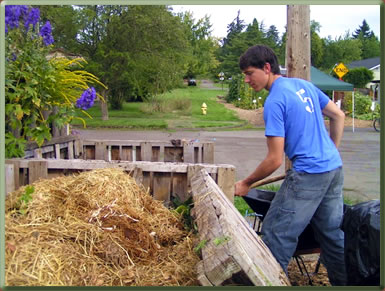
Not all WWOOF farms are in the countryside as proven by this urban garden in Eugene, Oregon where turning the compost bin is among the chores. Anne Donahue
Accommodations:
Sleeping arrangements range from cozy bedrooms with private bathrooms to tepees with no running water. Where will you sleep and do you have to bring any bedding items with you, such as sheets, pillows, blankets, towels or sleeping bags? What about bathroom facilities?
Meals:
Will three meals a day be provided? Even during off-time? Is the diet vegetarian or omnivorous? Local and organic? Will you be preparing your own meals?
Hours:
Ask for specifics on work hours. Some farms have vague listings such as “work until the project is finished.” However, even if hours are specified, ask for confirmation. Some farm listings are not up-to-date or change with the season. Look for an average of 25 hours/week so you have time to explore the area.
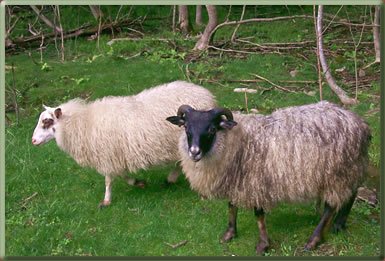
All Icelandic lambs on this sheep farm are named “Earl” as they were often destined for the butcher, and it is harder to part with them if they have individual pet names. Brian Bender
Work:
What kind of chores can you expect? If you have limitations, strengths or desires in certain areas, your host can probably accommodate, but you need to state them up front. Is the farm on a strict work-hours regimen, that is, will you be awakened by a rooster or a bugle or can you begin your work day on your own timetable? Will you be provided with guidance while working in the fields?
Seasonal Conditions:
Can you expect rain, sunshine, ticks, mosquitoes, or just plain gorgeous weather? This may be a factor in deciding when to travel to certain places.
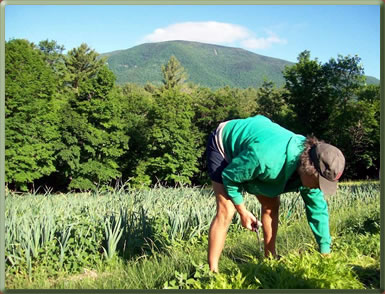
Harvesting arugula in the Green Mountains of Vermont. Brian Bender
Gear:
Are muck boots and work gloves provided or necessary to bring? Do you need rain gear or a wide-brimmed hat?
Group Size:
Farms range from peaceful abodes with one or two WWOOFers at a time to bustling communes. If you opt for a larger social environment, does your host have a policy for drugs and alcohol? The larger the group the less likely individuals will stay on top of their dirty dishes.
Duration:
Most farmers want at least a one-week commitment. Ask about this.
Getting There:
Do you want to be picked up from the bus station or airport? In most cases the host will gladly assist.
There is no pre-packaged WWOOF vacation. It works like a choose-your-own-adventure. If you want to develop skills as a homesteader, choose an off-grid (no electricity) site. If you want to start your own farm, try a full-season internship to get experience from seed to harvest. If you want to use WWOOFing as a means of touring the countryside, as I did, you might choose several different places, each for short-term stays.
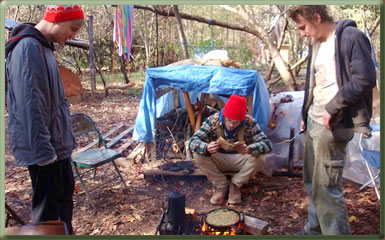
The author roughed it with camping and an outdoor kitchen at an off-grid farmstead in Georgia. Debbie Waugh
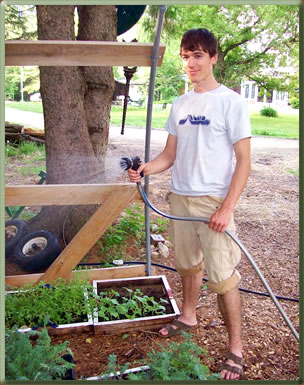
The author waters organic veggie starts at a farm in Vermont. Brian Bender
A wonderful thing about WWOOFing is that there is no contract. If you feel uncomfortable, you can just pack up and move on. If you want to tour the countryside far from the stampede of tourists and you don’t mind getting dirt under your fingernails in exchange for free room and board, WWOOFing offers a wealth of opportunity. In terms of life-education, my one year as a WWOOFer has been my best trip around the sun so far.
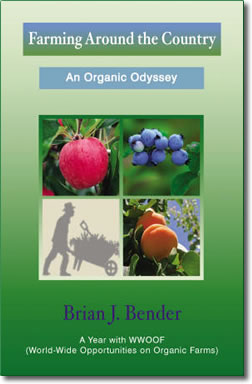 Farming Around the Country: An Organic Odyssey
Farming Around the Country: An Organic Odyssey
By Brian J. Bender
Published by NorLightsPress, 2010
240 pages, $15.95, ISBN: 978-1-935254-33-1
Available in online book stores and local bookshops.
Farming Around the Country reveals the humor and hardship of a life dominated by a revolving door of farm animals, injuries, eccentric farmers, and unexpected wisdom, leading to a clear appreciation of sustainable living and – perhaps more surprising – of human happiness. This entertaining and insightful read clearly documents the educational exchange between volunteers and the individuals, families and communities who cultivate the soil and produce crops to share.
Ryan “Leo” Goldsmith, Program Coordinator for WWOOF-USA writes: “This book achieves my highest expectations for a personal and engaging chronicle of WWOOF-USA in action … Beyond agriculture, Brian expounds upon the unbroken connection between sustainable farming, the natural environment, and the people who steward this relationship.”
Author Brian Bender lives in Eugene, Oregon where he gardens, meditates and forages for wild foods. A member of the Oregon Authors, he holds regular book signings for Farming Around the Country: An Organic Odyssey. Currently, he’s helping people start their own vegetable gardens in the Eugene area.. Email: benderjbender@yahoo.com.
Feel free to explore other stories about volunteer vacations well suited to senior travelers, their families and friends. Click on the titles below to read each inspiring article.
Volunteer to teach English in Crete
Volunteer for wildlife in Africa
Giant pandas need our help
Volunteer at India tea estate
Hawaiian Islands volunteer vacations
Cheetah volunteer vacations
Older travelers love volunteering
Volunteering in Rural Tanzania
Monitoring the health of Australia’s Great Barrier Reef
Earthwatch volunteers in Barbados
US Native volunteer vacations
Volunteer vacations worldwide
